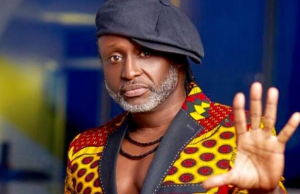Bianca Akweley Clinton’s story, ‘Africa’s Renaissance’, is a thought-provoking concept story that uses the analogy of an African market woman to comment on the state of leadership, the economy and politics in Africa. This story serves as a cautionary tale on how far we have departed from the vision of our founding fathers, especially Kwame Nkrumah.
Anastasia Allotey was born in the bourgeoisie Allotey family, the top-tier of the economic ladder in Ghana. Her view of Ghana was different from many people struggling to make ends meet, but she wasn’t anything close to being radical, politically or socially.
Her family was rich and discussions around the dinner-table often concerned the political landscape and state of the economy. Status quo was rarely investigated or critiqued – and her family’s elders or visitors often endorsed the traditional misled wisdom that the African continent, and by extension Ghana, were poor because most of the people were illiterate and didn’t have the necessary skills to adapt in a modern economy.
Anastasia herself didn’t have enough exposure of the real Ghana since she lived in a bubble full of echo-chambers; but all that was about to change as she had gotten admission to one of the most prestigious law schools in the country – Ghana School of Law – and she was about to spread her wings and learn about the country and values of society on her own terms.
Her parents recommended caution in making new friends, and suggested that she accompany only those who belong to her social class with attendant sensibilities. She nodded her way out of her home, but being ambitious and outgoing she was thrilled with the opportunity to live independently and find out where and how she belonged and fit into the world.
She landed in the newly-built accommodation wing in the Ghana School of Law at Makola, and immediately through her left window could see a thriving market next to the campus. She felt a strong pull toward it, and wanted to explore it at the earliest opportunity. Her roommate, Veronica, soon joined her and they both went to the market to buy snails.
Across the road from Ghana School of Law School stands Makola Market. It bustles with life every day – and not just with humans. One man was either trying to sell or had just purchased provisions, livestock, a snack, a chicken or a goat etc. As always, the flies hovered to take what insignificant bits they could. And on that day, it was the chickens which Anastasia Allotey noticed the most. They pecked and wandered around a chicken coop with an open top like she had seen at the zoo with well-behaved animals that have no reason to fly away. If only these chickens knew. But Anastasia was not shopping for chicken today.
The biggest shop in the market was run by a woman named Afua Mensah, but it was the name of the shop that attracted Anastasia’s attention. A big sign with glittering letters read ‘Africa’s Renaissance’ on a medium-sized building.
“What does that mean?” Anastasia asked.
“What? Africa’s Renaissance? Probably an attempt to romanticise this shoddy business as something that could change the fate of Ghana, but you and I both know it ain’t happening,” Veronica replied.
“I don’t know that and neither do you,” Anastasia said in a tone of stern caution.
“Chill out Anastasia, you were always so sensitive even when we first met in kindergarten. Don’t bother. I was just saying for the sake of it,” Anastasia replied with a smile.
Anastasia wanted to go inside the shop and talk to the owner, but could not do so as Veronica was being a millennial nuisance. She promised herself to come back on her own and dig further about why it was ‘Africa’s Renaissance’ as opposed to any indigenous Ghanaian name. It was a motto, a message, a warning that African rebirth was not only possible but unwrapping in real-time, and she was witnessing it.
A week later in law school, Anastasia got her first assignment. The Company Law instructor asked all the students to come up with original ideas about what ails the Ghanaian economy, and what policies and procedural legislation should be adopted to fix the manifold issues.
Most of the class unlatched their laptops and began searching for published sources to come up with solutions; but Anastasia had a better option, something that had stayed on her mind ever since she visited the market. She wouldn’t do armchair research but go out and look at the real-world businesses run by many illiterate women to see if the conventional theories of neoliberalism held any promise or remedy.
She got out of her class, crossed the road and found herself among the shouting and bargaining that usually goes on in a market. She headed straight for the ‘Africa’s Renaissance’ shop and asked if she could see Afua Mensah, the owner. She was told that Ms. Mensah was too busy to see visitors as her schedule had been packed for weeks.
Anastasia was shocked to hear that an illiterate woman running a shop in the market could be that busy. She persisted in her requests and said: “Please go and tell Ms. Mensah that I am a law student researching on the issues of Ghanaian economy and will not go back without meeting her”.
The assistant went inside the office and came back a minute later and invited Anastasia to come inside. The assistant closed the door behind her as Anastasia saw a middle-aged woman sitting behind a desk in a spacious office.
“You are very stubborn, they tell me,” Afua Mensah said.
“Yes I am. But thank you for your time, I promise it won’t go to waste,” Anastasia retorted, sitting down.
“It better not, because I don’t have a lot of it,” Afua said in a straightforward no-nonsense manner.
“What business school did you go to?” Anastasia asked.
“Ha ha, never did. I am a self-made woman, a product of circumstances and necessities. To do what I do, I don’t need to go to a business school,” Afua said in a confident tone.
Anastasia was taken aback by her response, and replied after a moment’s pause for reflection that allowed the assertion to sink in.
“Is this the only shop you have?” Anastasia asked innocently.
“Wow, you really are elite. I have an empire. Snail-farming, poultry farming, half a dozen cars running on Uber and fitness centres,” Afua replied.
“You run all that alone?” Anastasia asked, shocked.
“I use half my brain to do that,” Afua replied with a smirk.
“What’s your monthly revenue, like how many cedis if you don’t mind me asking?” Anastasia asked.
“Cedis? I don’t just deal in cedis. I export my products to foreign countries and my managers convert cedis into dollars. Honestly, I don’t know how much I’ve got,” Afua replied.
Anastasia sat there frozen when the realisation hit her that Afua Mensah, an uneducated woman, was probably a millionaire who exported her goods to foreign countries. She always thought that uneducated women didn’t have it in them to run a profitable and sustainable business – but here was Afua, the very personification of success and achievement. Anastasia thought that Afua was, in all likelihood, more competent and intelligent than the old politicians who ruled the country with an iron-fist – giving birth to a maze of order, a strict hierarchy where old men and power were the only things respected – but Afua Mensah was living within that very rotten system and challenging it.
“What do you think is the primary reason for the backwardness of Ghana’s economy and politics? I always thought it was the political class. What’s your take on it?” Anastasia asked.
“You wouldn’t be wrong in thinking that. Half the population is below thirty, and the politicians, some foreigners and landowners have a monopoly over our gold, diamonds and agriculture. Imagine if all those resources were channeled in an appropriate manner and people were given their due rights by ensuring inclusivity.
“Ghana and by extension the African continent’s fate would change over the course of a decade, but all of that is wasted through corruption, unbridled greed and exploitation. The rich resources are appropriated by a few families on top, while the rest of the population suffers in agony. Our country’s politics is like a snail. Tasty when nicely cooked but painfully static when it comes to movement.”
“And all this time, I believed illiteracy was the reason our country was not progressing.” Anastasia could only manage a sentence.
“Even if I grant you the benefit of the doubt and consider that illiteracy is indeed the cause of Africa going bankrupt, whose fault do you think that would be?” Afua asked in a manner that communicated to Anastasia she already knew the answer.
The market woman looked at Anastasia, half-amused at how eager she was to learn from her. Then she did something she hadn’t done in a while – she shared the knowledge that had made her rich.
“Do you know what makes us market women different from our dear leaders?”
- We live within our means
- We work to generate genuine profit
- We do not pillage the populace or our neighbours, and
- We do not take out loans we cannot afford to repay
“Have you heard of the Motte-and-Bailey castles of old Europe? I saw it on TV last night, and it was very interesting.
“I have heard the term before,” Anastasia replied.
“It’s the old fortifications their castles were built into. The motte is a hill; it is broad, it is productive, but it is difficult to defend. The bailey is the keep, the tower; the castle itself surrounded by water, only accessible by a bridge. This is the mindset we need in Ghana, in most of Africa. When times are good we use the motte; but when what we have is at risk, we draw the bridge and defend the bailey.”

“Do you know Switzerland?”
“I am familiar.”
“I’ve been there. The manufacturer sponsored a business trip. I couldn’t read a thing in German but I could tell the entire country is a motte-and-bailey. That’s why the Swiss are wealthy even though their country is small.”
“Do you think Ghana should be more like Switzerland, then?” Anastasia prodded.
“Switzerland has its virtues. Defending Ghana may not be as easy as defending Switzerland, but they have the Calvinist virtues. They know that God will reward honest work, and they don’t use the word ‘Christian’ to hide their deeds; their actions and work speaks for themselves. Sometimes, doing honest work means you have to disobey someone. Maybe mother wasn’t right about everything. Maybe the president is wrong. That’s disruptive, I know – but disruption means opportunity, and opportunity means prosperity.”
The discussion on Switzerland and British Motte and Bailey seemed a quite unusual conversation to have with a market woman; Anastasia wondered if she was in a dream or some sort of parallel universe. However, there are so many interesting ideas people pick up from television and want to share.
Afua and Anastasia shook hands as Anastasia departed back to her dorm – but not before assessing other women selling wholesale products in the market.
They were women – mostly with little formal education – and were amassing a fortune doing business. They mostly didn’t grow up or go to university to study market fluctuations or the stock exchange, but they knew the basics succinctly, and others had experience with the primary method – trial and error.
A breath of fresh-air struck Anastasia as she walked through the market with the stark realisation that Africa is indeed changing, Africa is indeed in the process of rebirth/rejuvenation led by many illiterate women – while the politicians, some foreigners, the landowning classes and status quo elites stood in their way.
Even more shocking was the realization that she herself belonged to the same extortionist group Afua talked about. Ghana and Africa are on the road to revolution, and if the politicians paid heed to calls for reformation this process would speed-up; but Anastasia saw no signs of that ever happening again because the elites live in walled fortresses bereft of any cognition regarding real-world issues facing millions of Africans.
To her understanding, the law college and market were a perfect metaphor for African societies separated by a road of misjudgment, misapprehensions and alienation. The illiterate women stood for the renaissance while the law college represented the old school colonial thought. The market was the future while traditionalism would bite the dust. The market was the fox and law school the snail. Anastasia recognised not only her own miseducation but also her privilege, and that she was able to do what she was doing only because she belonged to a landowning, elite, capital-intensive family; and the first step in transformation was the recognition that she herself was at fault – but this recognition would lead to rectification and hopefully reconciliation.
Anastasia Allotey walked through the market back to the Ghana School of Law. All over the market mall was the sound of Revolution Radio 10.10 FM booming the news of Jamie Nkrumah having been released by Ghana’s Secret Intelligence Agency BNI after his speech attempting to incite a coup. The speech was replayed of Jamie describing the government regime … “Simply put, it will take years for Ghana to recover from the incompetence, arrogance and inaptness we are all witnessing disguised as humility and wisdom of the elders”.
The irony is that no one would have known much about Jamie’s speech had the secret service not picked him up: now he had been released due to international pressure, everyone was listening to his words – and there was more chance of there actually being a coup d’etat.
Anastasia walked past the open chicken-coop again, with the live chickens in a makeshift coop which would surely fly out if they only knew how.
But this time, as Anastasia watched them, she noticed a chicken flap its wings and saw the feathers were clipped. All of them were.
These birds were never skillful flyers to begin with, but still their wings were clipped to keep them grounded; and the chickens could not escape the coop because one of each chicken’s feet had been cut off, so that the chickens could hop slightly in but not escape.
They were left to roam in the open air inside the box as if they were free. Anastasia wondered that the chicken’s existence seemed particularly cruel – first one foot had been cut off, then the chicken is restricted to hop in the coop while waiting to be slaughtered by its owner.
Maybe the sun was getting to Anastasia as she walked back to the law school – the practicality of seeing the market women’s profit in comparison to the politicians’ excuses for their unprofitable decisions, mingled with paying close attention to how chickens behaved in the coop, made Anastasia realise the cruelty faced by chickens could be the reflection of a society at the mercy of self-serving rulers…if only the chickens knew the possibilities of flying outside the chicken-box designed to keep them disadvantaged until they die.



Bianca Akweley Clinton is CEO & Founder of the international publishing company ‘Raindrops on Petals Ltd.’, as well as being a lawyer qualified in Ghana, England and Wales.




















